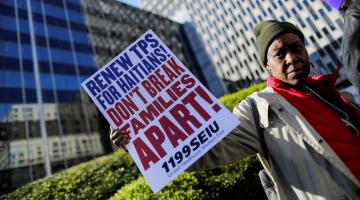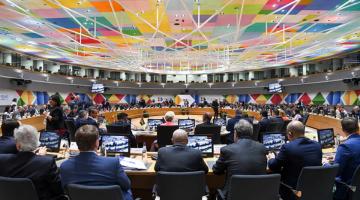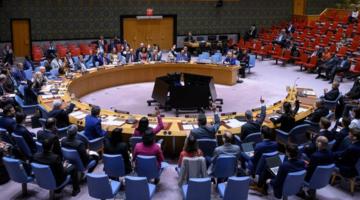The Trump administration is dismantling USAID, intending to absorb its mission into the State Department. USAID's engagement with Haiti demonstrates the insidious nature of the agency and how its resources are deployed to maintain U.S. interests.
Originally published in CEPR.
“We’re shutting it down,” Elon Musk said over the weekend in reference to USAID, the country’s main aid agency, which oversees around $40 billion a year in spending and has been around since the early 1960s. Following two weeks of chaos across the aid industry after the new US administration ordered a 90-day freeze on nearly all foreign assistance, it appears the Trump administration is attempting to move forward with a plan to close the agency and merge its responsibilities with the State Department, though legal challenges are likely.
Speaking Monday afternoon, Secretary of State Marco Rubio announced that he was serving as acting administrator for the aid agency. “This is not about ending USAID,” Rubio told the press, rather it was aimed at ensuring “everything they do has to be in alignment with the national interest and the foreign policy of the United States.”
Few countries across the world are as dependent on US foreign assistance as Haiti. Last year, I published a book, Aid State, that details the long-term, damaging political ramifications of foreign assistance in Haiti; how aid circumvented the democratic process, eroded sovereignty, undermined local businesses and government, and served more as a benefit to US special interest groups than to the local population. Simply stopping all aid flows overnight, however, will have significant effects in Haiti. According to US officials, there will be a process for organizations providing humanitarian assistance to request waivers that would allow them to continue operating; but the freeze in spending amounted to a stop work order, halting ongoing programs in their tracks.
Since October 2023 (the beginning of FY2024), USAID has obligated $368 million in contracts and grants for activities in Haiti, according to an analysis of data from USASpending.gov.1 Many of these awards are for multiyear programs. Coming up with a total figure for the amount of funding impacted by the recent spending freeze is nearly impossible, as it affected monies that had already been disbursed to contractors or grantees. Nevertheless, at a bare minimum — and if no programs were to receive a waiver to continue — the freeze will halt some $330 million in outstanding commitments to ongoing programs.
Much of the debate around the recent Trump administration actions have treated aid as a monolithic thing; either as strictly life-saving and urgent humanitarian assistance, or as nothing more than imperial political interventionism. The reality is more mixed. But, moving USAID under the State Department, as now seems to be the most likely scenario, will only make foreign assistance more political. It is the US doubling down on all the worst parts of the industry.
Local Procurement
Of course, as is the case across the globe, the vast majority of USAID spending goes to organizations or companies not in recipient countries, but right here in the United States. Only 7.6 percent of USAID’s spending for Haiti since October 2023 went directly to local organizations — though a larger percentage does make it to Haitian organizations through subcontracts, there is not detailed information at this level.
The largest Haitian recipient is the SEROvie Foundation, which provides services to at-risk youth, especially regarding the treatment of HIV/AIDS. The organization has been obligated $8.8 million since October 2023, and the funding freeze will halt at least an additional $2.5 million. Though there is a long-term benefit to reducing reliance on foreign assistance for such services, the halt in funding will have a direct effect on people’s lives — including those employed by the organization, adding to the already impossibly difficult employment situation in Haiti.
But not all local procurement is created equally. The freeze will also affect some $1.4 million in funding for Papyrus S.A., a local firm that runs USAID’s Civil Society Strengthening Program — which works with local organizations to increase their capacity to comply with USAID’s stringent funding requirements. CEPR has argued previously that such endeavors are misguided. Foreign assistance should aim to increase the capacity of local organizations to deliver results, not jump through unnecessary hoops. With the possible closing of USAID, the $7.5 million program which began in the fall of 2022 will be rendered moot.
Funding to UN Agencies
Though there was a time when USAID implemented programs directly, over recent decades the organization has largely been outsourced to contractors and grantees. Given the difficulty of humanitarian access in Haiti in recent years, this has meant an increasing reliance on UN agencies that operate in the country. Of the $368 million obligated since the beginning of FY2024, some 40 percent of that has gone directly to the World Food Programme (WFP), UNICEF, the Pan-American Health Organization, the UN Development Program, the UN Population Fund, the International Organization for Migration (IOM), and the UN Office for the Coordination of Humanitarian Affairs.
In fact, WFP and IOM have been the two largest recipients of USAID funding in recent years. Some of this funding, if cut, will directly affect the Trump administration’s goal of increasing deportations. There is nearly $9 million in undisbursed funds to the IOM for a program aimed at increasing the capacity of Haiti to receive deportees, for example. The IOM also plays a significant role in managing camps for the internally displaced, which now officially hold upward of one million Haitians. The fact that an international entity is providing these services instead of the Haitian government is a real problem, and also a consequence of decades of aid policies that weakened Haiti’s government and outsourced provision of services. But simply ending support for the displaced population is likely to only exacerbate the suffering and encourage even greater migratory flows. Nearly $39 million remains undisbursed for that program.
The WFP is the single largest recipient of USAID funding, having received more than $70 million since the beginning of FY2024. Historically, food assistance has played an instrumental role in undermining local production and decimating Haiti’s farmers — and certain emergency food aid programs, which largely rely on surplus US agricultural commodities, have been exempt from the freeze.
But, unlike most US food assistance, the funding to the WFP includes significant support to local producers. WFP runs a school lunch program in Haiti, which reached nearly half-a-million people last year. In recent years, the share of food purchased locally has increased drastically and the organization aims to reach 100 percent locally procured food by 2028. “The government’s goal is for all the food in schools to be locally produced, and we want to help make that happen,” Wanja Kaaria, WFP’s Haiti country director, recently said.
The Beltway Bandits
As USAID became evermore reliant on contractors and grantees, a new crop of companies grew to fill the void. Beginning in the early 2000s, for-profit development companies largely based inside the Beltway — DC, Maryland, and Virginia — rose to prominence and began capturing an ever-larger share of USAID’s budget. One firm, Chemonics International, received some $1.5 billion globally in FY2024. These firms also dominated the post-quake reconstruction era in Haiti. In the 10 years after the earthquake, firms inside the beltway received more than half of all Haiti-related spending. Just two firms combined — Chemonics and Development Alternatives Inc. (DAI) — received more than 20 percent.
Early in Obama’s first term, the US launched USAID Forward, an ambitious reform program that aimed to break up big contracts consolidated in the hands of just a few firms, such as Chemonics. In response, these for-profit companies banded together to form the Coalition for International Development Companies (CIDC), which then hired a well-connected lobbyist to advocate against these commonsense reforms aimed at improving the delivery of foreign assistance.
Though — at least in Haiti — there has recently been a greater reliance on UN agencies and other multilateral entities, these beltway bandits remain significant players. DAI is currently operating three different programs in Haiti: one aimed at improving water systems, one focused on reforestation, and another in the agricultural sector. There is nearly $25 million committed, but not yet disbursed, to DAI through these three programs.
Tetra Tech meanwhile, is overseeing a five-year, $24 million program focused on citizen security. There remains nearly $20 million yet to be disbursed. In December 2024, USAID’s largest contractor, Chemonics, received a $25 million contract to implement a program titled “Justice Renewal and Advancement.”
These for-profit entities, however, have an extremely checkered history when it comes to delivering results, while a significant share of the contracts will go directly back to the Beltway in the form of overhead. The CEO of Chemonics, for example, makes an annual salary of $955,000.
Last week, Devex reported that some 3,000 development professionals in the DC-area would likely lose their jobs in the coming weeks.
Political Intervention
Aid is political, whether direct or indirect. And USAID specifically has been a pillar of US soft power for more than 60 years. Aid can have long-term structural political effects, as mentioned previously, but there are also more direct political interventions undertaken through USAID. In 2015, CEPR reported that USAID had given some $100,000 of in-kind support to an overtly political organization supporting then candidate Michel Martelly during the 2010/2011 electoral process in Haiti. USAID also provides funding for elections in Haiti.
In September, USAID gave $1 million to the United Nations Development Programme (UNDP), which manages the “basket fund” for donors to provide funding to the Provisional Electoral Council that will manage the upcoming electoral process (currently scheduled for this fall, it would be the first elections in Haiti since 2016). Though nobody questions the need for elections, foreign financing of Haiti’s electoral processes has contributed to the outsourcing of the country’s democracy and has given foreign powers even greater leverage over the nation’s politics.
USAID also awarded a $17 million grant to the Consortium for Elections and Political Process Strengthening, which is composed of three entities: The National Democratic Institute (NDI), the International Republican Institute (IRI), and the International Foundation for Electoral Systems (IFES). Though accounting for just 3 percent of USAID’s spending since FY2024, the work of these entities has traditionally been more overtly political — as the consortium’s name indicates. IRI, for example, played a key role in fomenting opposition to the Aristide government in the early 2000s.
Conclusion
The term “aid” encompasses many different things: humanitarian assistance and development programming, contracts and grants, support to local organizations and multimillion dollar contracts to DC-area firms. There are many parts of the US foreign aid industry that can and should be stopped or significantly reformed. But that doesn’t mean that shutting down USAID, or making its assistance even more overtly political by placing it under the umbrella of the State Department, is going to be a good thing, either in the short or long term. The reality is that, where foreign assistance is least effective, it is largely because it is designed to promote US interests rather than address the needs of those ostensibly on the receiving end. The changes announced by the Trump administration are not likely to truly disrupt US soft power abroad. If anything, it will make political interventionism an even more explicit aim of US foreign assistance.
Jake Johnson is the Director of International Research at CEPR. His research has focused predominantly on economic policy in Latin America, the International Monetary Fund, and US foreign policy. Jake has a BA in economics from Boston University and an MA in writing from Johns Hopkins University. He is the lead author for CEPR’s Haiti: Relief and Reconstruction Watch blog, and his articles and op-eds have been published in outlets such as The New York Times, The Nation, Le Monde diplomatique, and Al Jazeera. He is the author of Aid State: Elite Panic, Disaster Capitalism, and the Battle to Control Haiti from St. Martin’s Press.



















